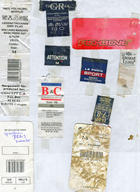 The Clean Clothes Campaign is a global network whose objectives are to end sweatshops and to support garment workers in the third world.
The Clean Clothes Campaign is a global network whose objectives are to end sweatshops and to support garment workers in the third world.
CCC works both in and beyond the spotlight. Initially, CCC quietly researches the garment industry’s complex supply chain, and where it finds examples of abuse it contacts a factory’s management team to try to ameliorate labour conditions there. If this fails, CCC then seeks publicity, organizes demonstrations, and mobilizes the consumer public.
 The textile industry in third world countries is characterized by low wages, a 70-80-hour working week, extremely poor working conditions, female labour, and sexual intimidation. Garment manufacturers are often openly hostile to trade unions. In Bangladesh, working in the textile industry can be lethal, and the struggle to secure social improvement can be fierce. In 2006 workers set fire to 200 of the factories in which they worked.
The textile industry in third world countries is characterized by low wages, a 70-80-hour working week, extremely poor working conditions, female labour, and sexual intimidation. Garment manufacturers are often openly hostile to trade unions. In Bangladesh, working in the textile industry can be lethal, and the struggle to secure social improvement can be fierce. In 2006 workers set fire to 200 of the factories in which they worked.
Well known of course is the collapse of the Rana Plaza building on 24 April 2013; the official death toll was 1,127.
 Less well known is the case of the SPECTRUM factory, located on a swampy parcel of land near Dhaka.
Less well known is the case of the SPECTRUM factory, located on a swampy parcel of land near Dhaka.
In 2002 the Spectrum management decided to build an additional five storeys on top of the four-storey factory. Warnings by workers of cracks appearing in walls were dismissed.
In the early morning of 11 April 2005 the monstrosity collapsed and 64 workers, who were not even officially on duty, were killed. Various western companies served by the Spectrum factory denied liability for the disaster. But labels from a number of companies, including “Le Frog”, were recovered from the debris to serve as proof of their involvement, and CCC tried to secure financial support for those disabled in the disaster and for the relatives of those who had perished.
 CCC was established in the Netherlands in 1990 and is now active in eleven countries, including Spain (Ropa Limpia), Germany (Saubere Kleidung), France (Ethique sur l'étiquette), and the UK (Labour Behind the Label). The CCC’s archive, measuring 27.5 metres, is now with the IISH. Access to the archive is restricted as it contains many files on contentious issues or cases currently before the court. To obtain written permission from CCC to consult the archive, please contact the IISH Reading Room at ask@iisg.nl.
CCC was established in the Netherlands in 1990 and is now active in eleven countries, including Spain (Ropa Limpia), Germany (Saubere Kleidung), France (Ethique sur l'étiquette), and the UK (Labour Behind the Label). The CCC’s archive, measuring 27.5 metres, is now with the IISH. Access to the archive is restricted as it contains many files on contentious issues or cases currently before the court. To obtain written permission from CCC to consult the archive, please contact the IISH Reading Room at ask@iisg.nl.
[Liesbeth Sluiter, Clean Clothes: A Global Movement to End Sweatshops (London, 2009). See also: Posters from Bangladesh, web expo IISH]
